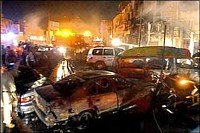Analysis: Basra fears a security disaster if British leave the field to militias
 Aftermath of a car bomb attack in Basra
Aftermath of a car bomb attack in BasraEVER since they arrived in southern Iraq, and six Royal Military policemen were killed by an armed mob of tribesmen, British forces have faced at best a mixed reaction from the Shia population.
As General Sir Richard Dannatt’s words were reported around the world, opinion in Washington and also in Basra was divided over whether a British pullout would make matters better or worse.
In 2003 many of Basra’s merchants had been happy that British troops were bringing a semblance of order to the postwar chaos. But the lack of postwar reconstruction progress soon stoked anger among unemployed Shia youths. That anger has been skilfully exploited by hardline Shia militias with Iranian backing.
The infiltration by the religious militias has put the British forces in a difficult position: with fewer than 8,000 troops in the south, plus a contingent of soon-to-depart Italians and Danes, the Army does not have the manpower to go after the armed groups and risk a full-scale Shia rebellion. Such an uprising could dwarf the insurgency that the Americans are struggling to contain within the Sunni minority to the north.
The Army was forced to turn a blind eye as the militias slowly took over the city, killing their opponents and anyone who did not conform to strict Islamic codes — women without head scarves, including Basra’s many Christians, and musicians and alcohol sellers. Most Sunnis have been forced out of the city. Academics have fled to Syria.
Suham Khudayir, who works at the state oil company, said: “Our security forces are weak and incompetent and sometimes infiltrated by political groups. If the British Army pull out there will be a huge security gap that might lead to a disaster in the city.”
Read the rest at the London Times

<< Home